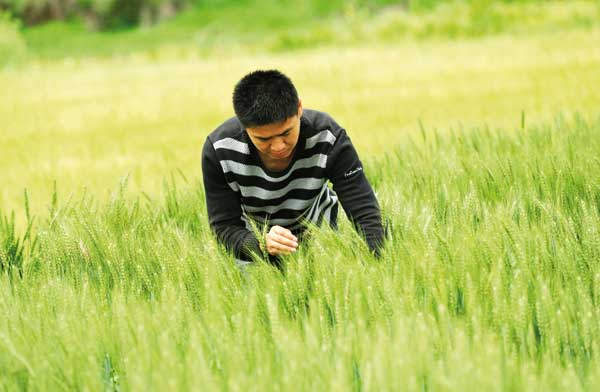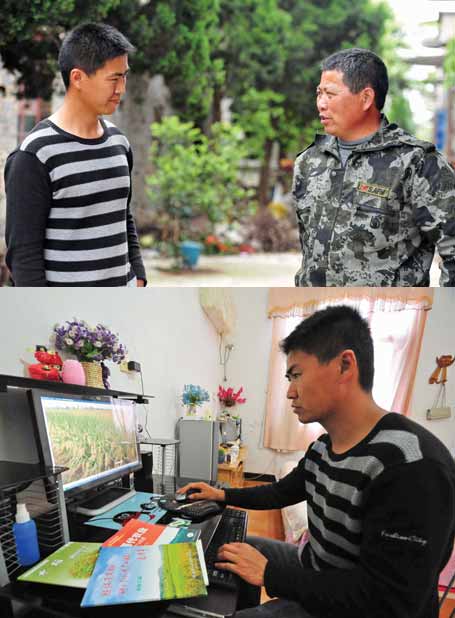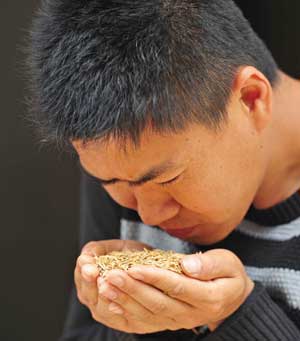Back to the land
 |
|
Yuan Songsong works in the hybrid rice fields of Jiujiang, Jiangxi province. Photos by Hu Guolin / For China Daily |
 |
|
Top: Yuan Songsong and his father Yuan Fusheng talk about planting hybrid rice species. Below: Yuan absorbs agricultural knowledge online. |
A former office worker, who returned to farm in his hometown, is one of the few examples of reverse migration. Yang Guang reports in Jiujiang, Jiangxi province.
While millions of rural workers are migrating to urban centers, Yuan Songsong has done the opposite. The 34-year-old quit his job as secretary of a public security bureau in Shenzhen, Guangdong province, and returned to his hometown of Jiujiang in Jiangxi province to seek his fortune farming.
"It was not easy for a rural youngster like me to land a (public service) job," he says. "But I still burned with the desire to return and become wealthy by growing rice."
Yuan didn't make the decision on a whim, as he knew that if farming was approached the right way it would succeed.
After graduating from senior high school, Yuan served in the army for three years. In 2000, he finished his military service and joined his fellow migrant workers in venturing to big cities and did various jobs, such as factory worker and security guard.
Even so, he always paid attention to the development of rural areas. "I found that rural youngsters rarely wanted to stay in the countryside," Yuan says. "It's such a pity that so much land is left uncultivated."
In 2004, he read a newspaper report about the research findings of Yuan Longping, an agricultural scientist known as the "father of Chinese hybrid rice species". He started writing letters to Yuan Longping, expressing his concerns and asking for suggestions.
"Since Yuan Longping has made such great contributions to solving food shortage problems in China, I figured he could also play an important role in improving the current situation in rural areas," he says.
Yuan Songsong was invited to take part in a China Central Television show in 2008, when he discussed the situation with Yuan Longping and other agricultural scientists and representatives from rural areas. He asked whether Yuan Longping could help if he introduced hybrid rice species to his village and established a production base. Yuan Songsong checks whether hybrid rice seeds in storage have gone bad.
 |
|
Yuan Songsong checks whether hybrid rice seeds in storage have gone bad. |
Yuan Longping's encouragement strengthened his resolve to return to his hometown, but it was Jiangxi province's Party secretary Su Rong, who helped him make his final decision.
Yuan had written to Su about his plan to lead fellow farmers to get rich and grow rice on a large scale, and asked what support the government could give.
Yuan says he was surprised when Su called just one week later. During the seven-minute conversation, Su encouraged him to return to his hometown and confirmed the provincial government would provide support for increasing grain production.
At the end of 2008, Yuan, with his wife and daughter, finally returned to the fields his parents had plowed for several decades - despite their strong objections.
"It's true that one can make money by toiling in the fields, but it's much harder than sitting in the office," says his father, Yuan Fusheng.
Even so, the 56-year-old and his wife followed their son and worked on their 20 hectares of farmland.
To save time, Yuan set up a tent by the side of the fields he leased in his neighboring village. The family cultivated the land during the day and spent nights in the tent.
He was rewarded with a harvest that year. The maximum output of a 0.07 hectare hybrid rice field is 860 kg, while the average field produces 500 kg.
But the income was not satisfactory, considering the high costs. "Young laborers have all gone to the cities," Yuan explains.
"As a result, the labor costs are high. Also, it is impossible to get a satisfactory discount to purchase agricultural resources, if the production scale is not large enough."
It was then that Yuan came up with the idea of developing a cooperative to lower the costs and raise the profit margins.
In 2010, he started a cooperative with more than 500 farmers, covering areas in Jiujiang, Jingdezhen and Shangrao.
Yuan says running the cooperative is not easy. "It takes patience," he explains. "The farmers were not easily convinced of the advantages a cooperative would bring and feared they would be taken advantage of."
Zhan Renhui was one of the first members of the cooperative.

"I didn't believe him at the beginning," the 46-year-old says. "After he took his time to explain it to me again and again, I agreed to try. I finally trusted him after experiencing the benefits of purchasing chemical fertilizer at a much lower price."
Yuan realizes that youths are needed to further develop the cooperative. "I want to be a professional farmer, and I feel this is where my value lies," he says.
Contact the writer at yangguang@chinadaily.com.cn.
















